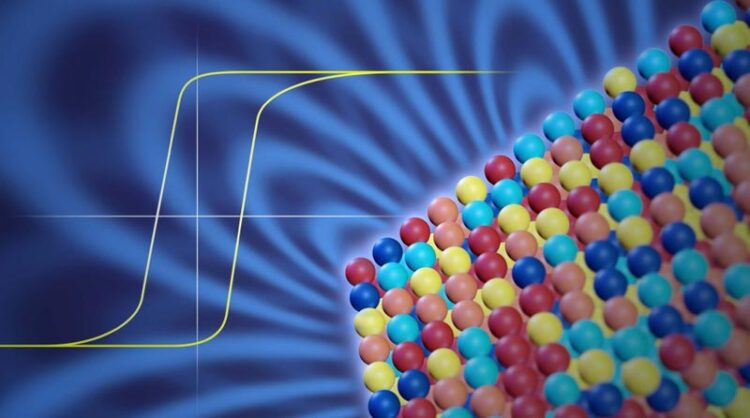Optimized magnets for the energy transition

Representation of a unit cell which is designed via compositionally complex alloy design together with related magnetic features.
Picture: Tianyi You
European Innovation Council funds Europe-wide project led by TU Darmstadt.
Magnets are key materials for the energy transition. However, they often consist of critical raw materials. Scientists led by TU Darmstadt are now researching alternative magnetic materials as part of the “CoCoMag“ project. The European Innovation Council (EIC) is funding the project with three million euros.
Fossil fuels are increasingly being replaced by electricity generated from the sun, wind, and water. However, sufficient renewable energy is only the starting point towards climate neutrality. A true transition to a sustainable economy is only possible with the electrification of our infrastructures, which depends to a large extent on optimized and cost-effective magnetic materials – for example, in the use of wind turbines, electromobility, or even magnetic cooling as an alternative to conventional gas compression cooling.
To date, however, the best magnets have been produced using rare earths and thus raw materials that will be available in limited quantities for the foreseeable future. The European Union in general is 100 percent dependent on foreign suppliers for 14 out of 27 crucial raw materials. The European Innovation Council is now supporting a Europe-wide research project on new magnetic materials that do not require these critical raw materials. This will avoid economic dependencies and make the production of magnets more cost-effective, since only readily available raw materials will be used.
Better magnets independent of rare earths and cobalt
“The aim of the project is to synthesize, produce and test new alloys suitable for permanent magnets and magnetocaloric applications without using rare earths and cobalt,” explains Oliver Gutfleisch, professor of functional materials at the Department of Materials and Earth Sciences at Darmstadt University of Technology who is the coordinator of the new project. “This step is crucial to accelerate the electrification of our infrastructures.”
Conventional alloys traditionally consist of one to two main elements and several other elements in small amounts. The research team has now developed a new design concept for magnets: “Our alloys consist of several main elements in relatively high concentrations, known in technical jargon as high entropy alloys. This allows the properties of the individual elements to be fully exploited, which means that the new magnets will not only be more sustainable, but also more malleable and corrosion-resistant,” says Dr. Liuliu Han, project leader at the Max Planck Institute for Iron Research, which is also a project partner.
Project CoCoMag
The CoCoMag (Multi-property Compositionally Complex Magnets for Advanced Energy Applications) project is supported by the EU’s “Pathfinder Open” funding line, which aims to identify radically new technologies that have the potential to create entirely new markets. To this end, visionary and high-risk projects are funded at an early stage of development.
In addition to the Technical University of Darmstadt, the project also involves Düsseldorf-based Max Planck Institute for Iron Research (MPIE, Germany), Chalmers University of Technologies (Sweden), Danube University Krems (Austria) and the University of Seville (Spain), as well as companies from Germany (MagnoTherm Solutions GmbH, a spin-off of TU Darmstadt), Italy (New Ideas 4.0) and Greece (AMEN New Technologies). The now approved project paves the way for a breakthrough transformation in the fields of electromobility and refrigeration, which currently rely on rare earths and cobalt. New innovative magnets made from complexly composed alloys will be more cost-effective, reduce the environmental footprint and optimize the necessary properties.
Research Group Functional Materials
The international group of Functional Materials around Prof. Oliver Gutfleisch at TU Darmstadt conducts fundamental and applied materials research for the fields of energy conversion, mobility, cooling, medicine, and robotics as well as hydrogen liquefaction and storage. The focus is on advanced nanostructured magnetic materials, which are analysed and modelled on all length scales, from the atom to the device.
About TU Darmstadt
TU Darmstadt is one of Germany’s leading technical universities and a synonym for excellent, relevant research. We are crucially shaping global transformations – from the energy transition via Industry 4.0 to artificial intelligence – with outstanding insights and forward-looking study opportunities.
TU Darmstadt pools its cutting-edge research in three fields: Energy and Environment, Information and Intelligence, Matter and Materials. Our problem-based interdisciplinarity as well as our productive interaction with society, business and politics generate progress towards sustainable development worldwide.
Since we were founded in 1877, we have been one of Germany’s most international universities; as a European technical university, we are developing a trans-European campus in the network, Unite! With our partners in the alliance of Rhine-Main universities – Goethe University Frankfurt and Johannes Gutenberg University Mainz – we further the development of the metropolitan region Frankfurt-Rhine-Main as a globally attractive science location.
www.tu-darmstadt.de
MI-Nr. 31e/2023
Wissenschaftliche Ansprechpartner:
Professor Oliver Gutfleisch
Research Group Functional Materials
Department of Materials and Earth Sciences
E-Mail: oliver.gutfleisch@tu-darmstadt.de
https://www.tu-darmstadt.de/universitaet/aktuelles_meldungen/einzelansicht_410560.en.jsp
Media Contact
All latest news from the category: Awards Funding
Newest articles

First-of-its-kind study uses remote sensing to monitor plastic debris in rivers and lakes
Remote sensing creates a cost-effective solution to monitoring plastic pollution. A first-of-its-kind study from researchers at the University of Minnesota Twin Cities shows how remote sensing can help monitor and…

Laser-based artificial neuron mimics nerve cell functions at lightning speed
With a processing speed a billion times faster than nature, chip-based laser neuron could help advance AI tasks such as pattern recognition and sequence prediction. Researchers have developed a laser-based…

Optimising the processing of plastic waste
Just one look in the yellow bin reveals a colourful jumble of different types of plastic. However, the purer and more uniform plastic waste is, the easier it is to…



